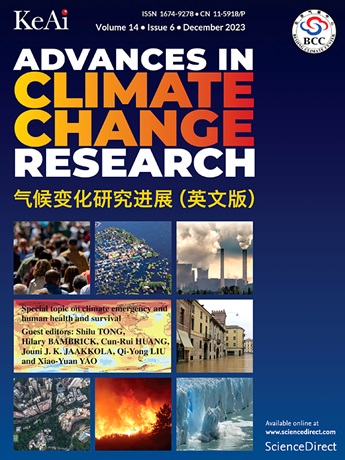Quantifying indirect economic losses from extreme events to inform global and local adaptation strategies
IF 5.2
1区 地球科学
Q1 ENVIRONMENTAL SCIENCES
引用次数: 0
Abstract
Existing studies on extreme event attribution are typically event-specific, particularly those conducted since the early 2000s. They primarily focus on direct economic losses to people and physical assets while overlooking the broader indirect losses that ripple through supply chains. Here, we combine disaster data with attribution studies and employ a global multi-regional input‒output model to assess both direct and indirect economic losses from droughts, floods, and storms attributable to anthropogenic climate change between 2009 and 2019. Our findings reveal that such extreme events cause 60.32 billion USD in direct economic losses and 65.07 billion USD in indirect economic losses annually—together accounting for about 46% of total losses from all extreme events. Climate adaptation investments are urgently needed in sectors such as manufacturing, agriculture, construction, transportation, and finance, with vulnerable regions concentrated in parts of Asia. International trade and industry linkages amplify the domestic impact of international extreme events, with 17% of China's attributable losses stemming from disasters abroad. This suggests that overseas adaptation could yield domestic resilience benefits. This study underscores the interconnected nature of global economic resilience against climate change and supports the design of equitable, science-based international climate finance mechanisms.
量化极端事件造成的间接经济损失,为全球和地方适应战略提供信息
现有的极端事件归因研究通常是针对特定事件的,特别是自21世纪初以来进行的研究。他们主要关注人员和实物资产的直接经济损失,而忽略了在供应链中波及的更广泛的间接损失。本研究将灾害数据与归因研究相结合,采用全球多区域投入产出模型评估了2009年至2019年间由人为气候变化造成的干旱、洪水和风暴的直接和间接经济损失。我们的研究结果表明,这类极端事件每年造成603.2亿美元的直接经济损失和650.7亿美元的间接经济损失,约占所有极端事件总损失的46%。制造业、农业、建筑、交通和金融等行业迫切需要气候适应投资,脆弱地区集中在亚洲部分地区。国际贸易和工业联系放大了国际极端事件对国内的影响,中国17%的可归因损失来自国外灾害。这表明,海外适应可能会带来国内弹性效益。本研究强调了全球经济抵御气候变化能力的相互关联性,并支持设计公平、科学的国际气候融资机制。
本文章由计算机程序翻译,如有差异,请以英文原文为准。
求助全文
约1分钟内获得全文
求助全文
来源期刊

Advances in Climate Change Research
Earth and Planetary Sciences-Atmospheric Science
CiteScore
9.80
自引率
4.10%
发文量
424
审稿时长
107 days
期刊介绍:
Advances in Climate Change Research publishes scientific research and analyses on climate change and the interactions of climate change with society. This journal encompasses basic science and economic, social, and policy research, including studies on mitigation and adaptation to climate change.
Advances in Climate Change Research attempts to promote research in climate change and provide an impetus for the application of research achievements in numerous aspects, such as socioeconomic sustainable development, responses to the adaptation and mitigation of climate change, diplomatic negotiations of climate and environment policies, and the protection and exploitation of natural resources.
 求助内容:
求助内容: 应助结果提醒方式:
应助结果提醒方式:


